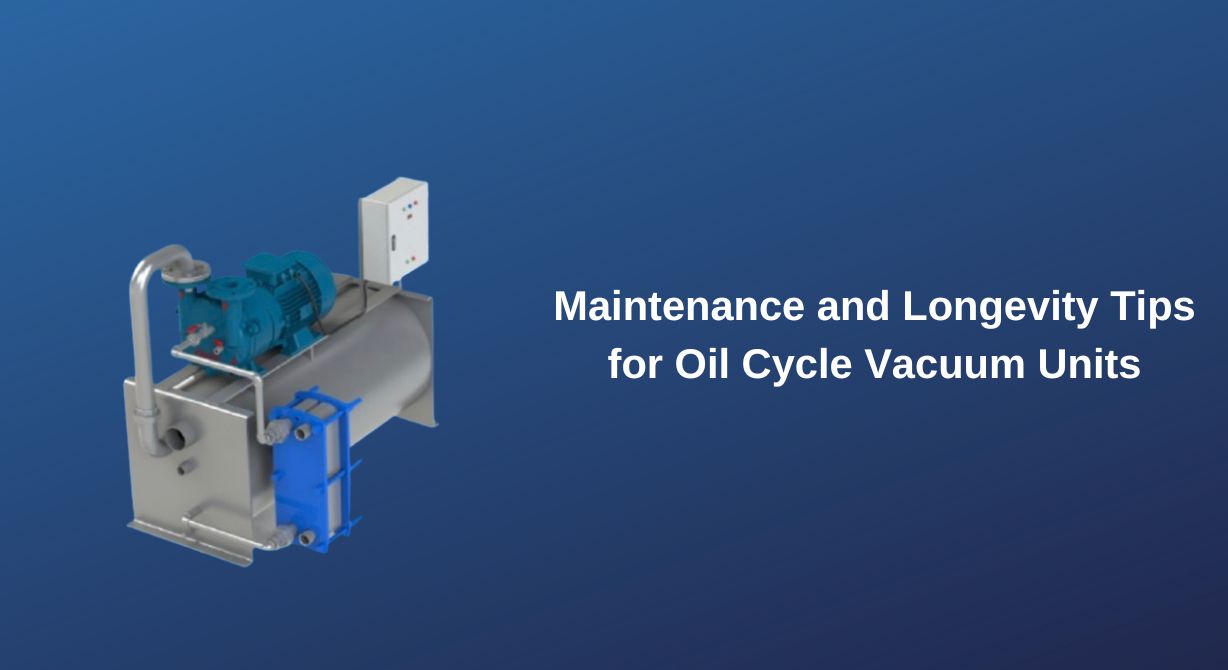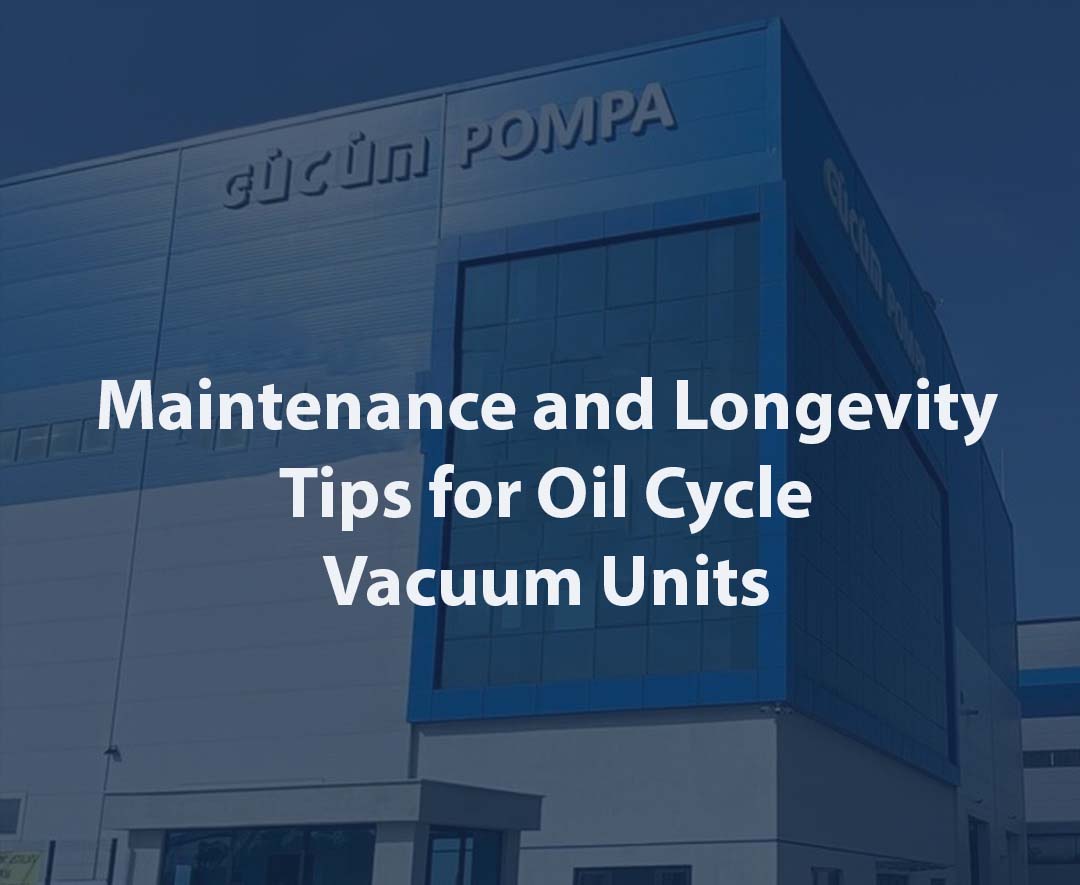Maintenance and Longevity Tips for Oil Cycle Vacuum Units
Contents
- Oil Cycle Vacuum Units Maintenance and Longevity Tips
- Oil Selection and Filtration for Oil Cycle Vacuum Units
- Oil Change and Cleaning in Vacuum Unit
- General Maintenance Tips for Oil Cycle Vacuum Units
- Tips for Long-Term Performance
- Ways to Increase the Efficiency of Oil Cycle Vacuum Units
- Precautions to be Taken for the Safety of the Vacuum Unit
Oil Cycle Vacuum Units Maintenance and Longevity Tips
Maintenance of oil cycle vacuum units is very important for the device to operate efficiently for a long time. Regular maintenance ensures that the device operates at high performance and prevents malfunctions. As a first step, the oil level needs to be checked. If the oil level is too low, it may cause the unit's motor to overheat and cause the device to operate inefficiently. On the other hand, too much oil level may cause the engine to operate under unnecessary load. Therefore, it is important to check the oil level regularly and keep it at the correct level.
Regular replacement of the vacuum unit's filters is also an important part of maintenance. Filters are one of the most critical components that affect air quality and the efficiency of the vacuum system. Clogged filters can seriously reduce the efficiency of the unit and cause the motor to consume more energy. Therefore, filters need to be cleaned or replaced with new ones at regular intervals. General cleaning of the vacuum unit should also be done regularly. Dust and dirt accumulated on the unit may block the cooling system of the device and cause the engine to overheat.

Oil Selection and Filtration for Oil Cycle Vacuum Units
The oil used in oil cycle vacuum units is very important for the efficient operation of the device. Oil ensures smooth engine operation, reduces friction and prevents overheating. Therefore, the right oil must be selected and the quality of the oil used must be high. When choosing oil, factors such as the usage conditions and operating temperature of the vacuum unit should be taken into consideration. The viscosity level of the oil used needs to be correct as this affects how well the oil performs.
The filtration system of the vacuum unit ensures effective preservation of oil. Particles accumulated in the oil can damage the internal mechanisms of the device and prevent the engine from working efficiently. Therefore, it is necessary to regularly check and clean the filtration system. Clogging of the filter may prevent oil circulation and cause the engine to consume more energy. Therefore, ensuring that the oil filtration system works efficiently ensures the long life of the device.
Oil Change and Cleaning in Vacuum Unit
Oil change and cleaning are the most important stages of maintenance of oil cycle vacuum units. Oil change frequency may vary depending on the intensity of use of the unit and operating conditions. Generally, it is recommended to change the oil of the vacuum unit every 3 to 6 months. During an oil change, the old oil must be completely drained and the correct amount of new oil must be added. Old oil can become contaminated over time and prevent the oil from working efficiently. Therefore, regular oil change ensures healthy operation of the vacuum unit.
The cleaning process of the vacuum unit is also very important. During oil change, it is necessary to clean the internal mechanisms of the unit. Dirt accumulated inside the device can prevent the oil from distributing efficiently and cause the engine to overheat. Therefore, cleaning must be done at every oil change of the vacuum unit. During cleaning, particular attention should be paid to the cleanliness of the engine and filters. The outer surface of the unit should also be wiped regularly and removed from dust.
General Maintenance Tips for Oil Cycle Vacuum Units
Maintenance of oil cycle vacuum units is not just about oil change and filter cleaning. Checking the unit regularly is very important for long-lasting use. Periodic tests should be performed to ensure that all components of the vacuum unit are working correctly. These tests check whether the engine is running efficiently and whether there are any leaks in the system. The unit's connection points and hoses should also be checked regularly. Leaks or loose connections may prevent the unit from operating efficiently.
The operating environment of the vacuum unit is also an important factor affecting the maintenance process. The area where the unit is placed must be clean and dry. Otherwise, dust and moisture accumulated in the environment may damage the internal mechanisms of the device. Make sure that the area where the vacuum unit is located is well ventilated. Otherwise, extreme temperatures and bad weather conditions may adversely affect the performance of the unit. Therefore, the device must be used in the correct environment and regular maintenance must be carried out.
Tips for Long-Term Performance
There are a few simple tips for the long-term performance of oil cycle vacuum units. First, the vacuum unit must be used correctly. Operating the device only when necessary prevents the motor from overheating and saves energy. It is important that the environmental conditions are suitable for the vacuum unit to work efficiently. The unit should not be operated in extremely hot or humid environments. Apart from this, the operating time of the vacuum unit is also an important factor. Vacuum units operating uninterruptedly for a long time may cause excessive wear and failure of the engine. Therefore, periodic rest periods should be given.
However, it is important to use proper oil for the vacuum unit to function properly. Oil reduces engine friction and prevents overheating. The most important factor to consider when choosing oil is the viscosity level of the oil. The oil level should also be checked regularly. Missing oil can cause the engine to strain and overheat. The vacuum unit's filters should be cleaned or replaced regularly. Clogging of the filters prevents the device from operating efficiently.
Ways to Increase the Efficiency of Oil Cycle Vacuum Units
Increasing the efficiency of oil cycle vacuum units allows businesses to save on energy consumption and allow the system to operate efficiently for longer. First, make sure that the oil level is set correctly. An excessive oil level will reduce the efficiency of the vacuum system, while a low oil level may cause engine strain. Therefore, it is necessary for the oil level to be at the specified level for the system to operate with optimum performance.
In addition, using the vacuum unit in accordance with environmental conditions is one of the factors that increase efficiency. Excessive temperature, dust and dirt can reduce the performance of the vacuum unit. The area where the unit is placed must be well ventilated and free of dust. Frequency of use and operating times of the vacuum unit also play an important role. Unnecessarily long periods of operation may cause the engine to overheat and operate inefficiently. Therefore, vacuum units should be operated only when necessary and given periodic rest periods.
Precautions to be Taken for the Safety of the Vacuum Unit
The safety of oil cycle vacuum units is of great importance for operational efficiency as well as employee health and occupational safety. First of all, safety instructions must be followed before using the unit. Moving parts of vacuum units such as power supplies, pumps and motors must be securely protected. It must be ensured that the electrical components are working properly and the cables are not damaged. It should be noted that all connection points of the vacuum unit are correctly positioned and sealed.
The ventilation system in the work area is also an important safety measure. Vacuum units can absorb some chemicals, so there must be good airflow in the environment where the unit operates. It is important that personnel maintaining the unit use protective equipment. Especially during oil changes, oil contact with skin should be prevented and these operations should be carried out with appropriate equipment. All these measures in terms of occupational safety ensure that the vacuum unit operates more efficiently and protect the health of employees.
